2024 NAUTILUS
Grand Winner /
Special Honors

World-Cultures / Transformational Growth & Development - Gold
Politics of Being: Wisdom and Science for a New Development Paradigm
Thomas Legrand
Ocean of Wisdom Press

About Thomas
Born in 1979 in Paris, France, Thomas Legrand is a wisdom seeker, a social scientist, and a sustainability practitioner. He holds a PhD in economics and has studied international development, political science, and management. Anchored in ecological and institutional economics, his PhD thesis was on the Costa Rican program of Payment for Environmental Services, which aims at conserving tropical forests.
Thomas works in the field of sustainability for UN agencies, private companies, and NGOs. His focus is on forest conservation, climate change, sustainable finance, organizational transformation, and leadership. His spiritual journey began at the age of twenty-three with an encounter with native spirituality in Mexico before embracing the wisdom of a wide range of traditions and practices, including meditation, energetic healing, and Tai-chi-chuan. He lives with his wife and their two young daughters
near Plum Village, the monastery of Zen Master Thich Nhat Hanh in the southwest of France.
Thomas’s spiritual search, his thoughts as a social scientist, and his professional experience have gradually converged on the importance of spiritual wisdom in humanity’s ongoing transition. Searching for a way to mainstream this understanding in the political and sustainability conversation, he has dedicated much of the last ten years to researching and reflecting how we can radically rethink our model of development. The result is this book.
“Anyone who is interested in preventing our collective consciousness sleepwalking to extinction should read this book. It is a very important, practrical treatice, [...] a wonderful book. If it reaches a critical mass, we could indeed hope for a more peaceful, just, sustainable, healthier and joyful world.”
Deepak Chopra,
Author and pioneer in integrative medicine and personal transformation
“A profound, insightful, extensively researched, sensitive and much needed essay which provides a precious roadmap for traveling together towards a better world”
Matthieu Ricard,
Author of Altruism: How Compassion Can Change Ourselves and the World
About the Book
What would a wisdom-based or “spiritual” approach to politics look like? How can we tap into science to support our collective conscious evolution?
In this groundbreaking work, Thomas Legrand Ph.D. proposes to fundamentally reframe our model of development from its current emphasis on “having” to one focused on “being”.
Mobilizing a wealth of scientific research from many different fields, the core teachings of wisdom traditions, and his own personal experience, Legrand articulates how politics can support human flourishing and the collective shift of consciousness that our current challenges demand.
An awakening journey into our human and social potential, Politics of Being charts the way for a truly human development in the 21st century, one to reconcile our minds and hearts, and the whole Earth community. Decision and policy-makers, scholars, sustainability and spiritual practitioners, social activists and citizens will benefit from:
- an integral map of such a politics as it emerges;
- concrete examples and recommendations in numerous areas ranging from education to governance, to justice and economy;
- a complex question converted into a clear and tangible agenda;
- a wealth of references to deepen their exploration;
- and much more.
A unique, field-defining, work on what may be the most important subject of our times… and history!
An Excerpt From the Book
Now is the time to tap into our highest wisdom to chart a new development path. The aim of this book is to propose a wisdom-based approach to politics, its definition, philosophical foundations, and concrete policies that can advance it through a robust
science-informed reflection. Humankind is undergoing an intense and rapid process of transformation, whose inner and outer dimensions cannot be separated. If we are to survive and thrive, our whole civilizations have to change. In order to do so, we cannot avoid a profound cultural change, a change of mindsets, worldviews, and values, or, at a more fundamental level, a shift in consciousness.
As the interrelated crises we are facing are deepening, their true nature is becoming increasingly clear. Greed, hatred, fear, rage, ignorance, selfishness, lies, bigotry, and fanaticism seem to be spreading everywhere in the world, impregnating political leadership and obstructing the changes our society urgently needs. On the other hand, they are helping us touch what is wrong in our collective consciousness, and, by doing so, they point the way out. They are the symptoms of a spiritual disease that we need to recognize, transform, and heal if humankind is to flourish in the future.
Darkness is said to be stronger just before dawn. Indeed, our awareness of this spiritual disease can allow us to develop the appropriate medicine. As we will see in this book, the required change needs to be so profound and all-encompassing, touching upon the very meaning of our lives and priorities, connecting us to our true nature, resonating with spiritual teachings, and constituting a deeply qualitative progress, that I can find no other way to define it than “spiritual.” This also simply means growing up collectively so that, more and more, we act as mature, responsible, and reasonable human beings—no more than that. Each of us already has such people in his or her neighborhood and daily life.
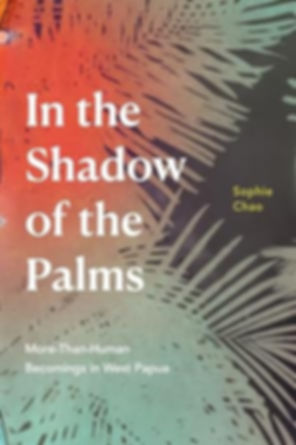
Special Honors: Best in Large Press
In the Shadow of the Palms: More-Than-Human Becomings in West Papua
Sophie Chao
With In the Shadow of the Palms, Sophie Chao examines the multispecies entanglements of oil palm plantations in West Papua, Indonesia, showing how Indigenous Marind communities understand and navigate the social, political, and environmental demands of the oil palm plant. As Chao notes, it is no secret that the palm oil sector has destructive environmental impacts: it greatly contributes to tropical deforestation and is a major driver of global warming. Situating the plant and the transformations it has brought within the context of West Papua’s volatile history of colonization, ethnic domination, and capitalist incursion, Chao traces how Marind attribute environmental destruction not just to humans, technologies, and capitalism but also to the volition and actions of the oil palm plant itself. By approaching cash crops as both drivers of destruction and subjects of human exploitation, Chao rethinks capitalist violence as a multispecies act. In the process, Chao centers how Marind fashion their own changing worlds and foreground Indigenous creativity and decolonial approaches to anthropology.
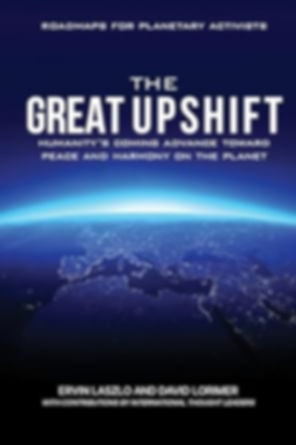
Special Honors: Best in Small Press
The Great Upshift
Ervin Laszlo and David Lorimer
This vital book leads us beyond today's crisis-and conflict-prone world to a higher stage of our evolution. We have reached a historic turning point-a "point of bifurcation"-at which we must find new ways to upshift our individual and collective consciousness to ensure the desired resolution of these crises.
Ervin Laszlo and David Lorimer, drawing on their holistic expertise and global network, have assembled a stellar cast of contributors who decode the big picture to offer exactly what we need now. The world-renowned scientists and visionaries who contribute to this book illuminate where are we today and where we can go from here. They focus on the most burning question of all: how can we upshift ourselves—our ways of healing, of thinking and feeling, and even of intuiting—to respond to the pressing requirements of our time?
Their visions empower us to "be the change" we want to see in the world-to help others be a positive and critical part of the great upshift that has already started. This will be our salvation. This compendium of insights into solutions for our world troubled by climate change, conflict, and unsustainable conditions calls for the conscious participation of all of us to implement the verities within.
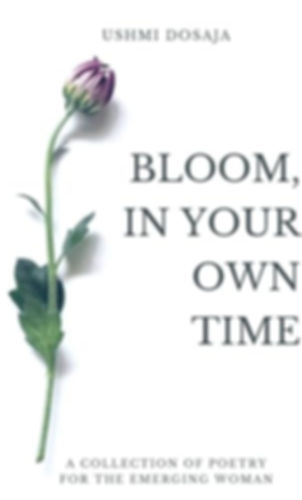
Special Honors: Poetry Debut Author
Bloom, In Your Own Time: A Collection of Poetry for the Emerging Woman
Ushmi Dosaja
Leaning into the edge of my known humanity and fueled by the desire to uncover more of the possibility of me, my curious and expectant mind asked the question 'who are you in your wonder?’ and my soul answered in a series of writings that has become my debut collection of poetry, ‘Bloom, in your own time.’
Written over a span of 2 years, the poems paint a journey of unravelling and the emergence of our true essence. They speak of wonder and magnificence, chaos and emergence, stories and sisterhood. But ultimately they are an invitation to both you and I to re-member ourselves to the wonder that is life and the knowing that we, as humans are indeed magical.

Special Honors: Children's Fiction Debut Author
Dr. Jon Jon Saves the Moon
Jackson Apollo Mancini, Arielle Trenk, illustrator
Since the beginning of time, kids have looked into the night sky and seen a glowing white moon and twinkling stars. But over time, they started to notice the moon had turned green! Dr. Jon Jon Saves the Moon is the story of what happens when we forget to take care of the world around us. The children of Earth send Dr. Jon Jon to give the moon a checkup and when he comes back, he has a message: the moon is a reflection of what we do to our precious planet and we must work together to care for our one and only home.
Dr. Jon Jon Saves the Moon follows in the footsteps of Greta Thunberg and the many other young people fighting for the health of our planet. Join Dr. Jon Jon on a trip to the moon and back and get inspired to help save the world!
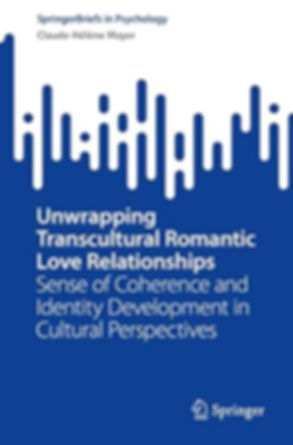
Special Honors: Academic Rigor
Unwrapping Transcultural Romantic Love Relationships
Claude-Hélène Mayer
This research study explores the interlinkages of three major themes, namely transcultural romantic love relationships (TRLRs), sense of coherence (SOC), and identity development (ID) in individuals who are presently involved in romantic love relationships (RLR) with partners from different cultural or ethnic backgrounds.
The findings show that TRLRsare firmly based on relationship qualities, strong feelings, common actions, spirituality, and future orientation. Further, the findings present clear interlinkages between TRLR and SOC, contributing positively to meaningfulness, manageability, and comprehensibility. Finally, TRLRs support SOC on intrapersonal, cultural, and interpersonal levels. In addition, they influence the development of identity awareness, actions, feelings, and sexual SOC. Conclusions, limitations, and recommendations for theory and practice are provided.
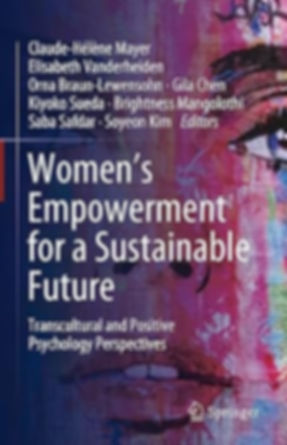
Special Honors: Academic Rigor
Women's Empowerment for a Sustainable Future Transcultural and Positive Psychology Perspectives
Claude-Hélène Mayer, Elisabeth Vanderheiden
This edited volume focuses on women’s empowerment for a sustainable future. It takes cultural and transcultural and positive psychology perspectives into consideration and explores the topic of women’s empowerment from diverse stances, across social strata, cultural divides as well as economic and political divisions. It addresses the critique of the overly Western focus of positive psychology on this topic by adopting a transnational and transcultural lens, and by taking non-WEIRD (Western, Educated, Industrialized, Rich, Democratic) samples into in-depth consideration.
The chapters therefore focus on women from diverse socio-cultural, political, socio-economic backgrounds and discuss their ways of empowering others and being empowered. They also discuss related positive psychology constructs, such as: coping, resilience, transformation, growth, leadership, creativity, identity development, sustainable action, as well as positive socio-economic, political and eco-sustainable thought and action. The volume as a whole looks at women's leadership as a factor of empowerment. A further fundamental assumption is that women’s empowerment is needed to create a sustainable future at micro-, meso- and macro levels, which presumes safety, peace, ecological considerations, and compassionate leadership.

